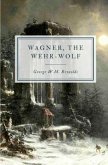In "Wagner, the Wehr-Wolf," George W. M. Reynolds delves into the gothic and sensationalist traditions of the 19th century, weaving a narrative rich with supernatural elements and psychological intrigue. The novel follows the exploits of the titular character, Wagner, an enigmatic figure whose curse transforms him into a werewolf under the moon's glow. The text captures Reynolds's mastery of melodramatic prose and vivid imagery, reflecting the anxieties of Victorian society around the themes of identity, morality, and the primal instincts lurking beneath the surface of civilization. The novel's intricate plot structures and complex characters resonate with contemporaneous Gothic literature, invoking the horrifying and the sublime, while also engaging with mythological references that amplify its narrative depth. George W. M. Reynolds, born in 1796, was a pivotal figure in the realm of popular literature during the Victorian era. His background as a journalist and an editor critically influenced his writing, pushing him to explore the macabre and sensational topics that captivated readers of his time. These experiences, coupled with the social upheavals of the period, imbued Reynolds's works with an in-depth understanding of human nature and society's darker aspects, making "Wagner, the Wehr-Wolf" a reflection of his era's turmoil and fascination with the supernatural. This compelling novel is highly recommended for readers interested in Gothic fiction, 19th-century literature, and the exploration of complex human emotions against a backdrop of horror. Reynolds's lyrical style and intricate narrative make it a significant text for those examining the intersection of myth and morality, as well as the evolution of vampire and werewolf lore in literature. Engage with this haunting tale that questions the boundaries between man and monster, and discover the chilling depths of Reynolds's imagination.
Dieser Download kann aus rechtlichen Gründen nur mit Rechnungsadresse in A, B, BG, CY, CZ, D, DK, EW, E, FIN, F, GR, H, IRL, I, LT, L, LR, M, NL, PL, P, R, S, SLO, SK ausgeliefert werden.









